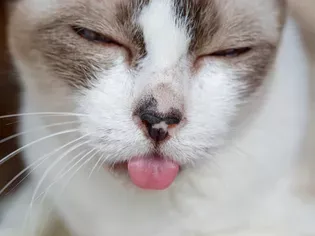Stomatitis in Cats
Updated on 04/26/24

Stomatitis in Cats: A Comprehensive Guide to Symptoms, Causes, and Treatment
Stomatitis, a chronic inflammation of the oral cavity, is a debilitating condition that can significantly affect the well-being of cats. Understanding its symptoms, causes, and treatment options is crucial for providing optimal care for affected felines.
Symptoms of Stomatitis in Cats
Stomatitis manifests through a range of oral symptoms, including:
* Persistent mouth pain and discomfort
* Excessive drooling (ptyalism)
* Difficulty eating (dysphagia)
* Weight loss
* Bad breath (halitosis)
* Recurrent oral ulcers and bleeding gums
* Pawing at the mouth
* Facial swelling
* Enlarged lymph nodes under the chin
Causes of Stomatitis in Cats
The exact cause of stomatitis in cats is often difficult to determine, but several factors have been implicated:
* Periodontal disease (gum disease): This is the most common underlying cause, as tartar buildup and infection can trigger an inflammatory response.
* Feline calicivirus (FCV): This virus is a known cause of stomatitis, particularly in young cats.
* Feline immunodeficiency virus (FIV): FIV-infected cats are more susceptible to chronic inflammation, including stomatitis.
* Feline leukemia virus (FeLV): FeLV can weaken the immune system, making cats more vulnerable to infections that lead to stomatitis.
* Other conditions: Allergies, autoimmune disorders, and certain medications can also contribute to oral inflammation.
Diagnosis of Stomatitis in Cats
A thorough examination by a veterinarian is essential for diagnosing stomatitis. This involves:
* Physical examination: Oral examination reveals inflammation, ulcers, and other signs of disease.
* Dental X-rays: Identify underlying periodontal disease or other dental abnormalities.
* Blood tests: Rule out systemic causes such as FIV or FeLV.
* Biopsy: In some cases, a biopsy of the affected tissue may be necessary to confirm the diagnosis.
Treatment of Stomatitis in Cats
Treatment for stomatitis in cats aims to reduce inflammation, alleviate pain, and address underlying causes. Options include:
* Dental care: Professional dental cleaning and extractions to remove tartar and diseased teeth.
* Anti-inflammatory medications: Non-steroidal anti-inflammatory drugs (NSAIDs) or corticosteroids to reduce inflammation and pain.
* Antibiotics: Systemic or topical antibiotics to treat secondary infections.
* Immunosuppressive drugs: To suppress the immune system in cases where autoimmune disorders are suspected.
* Laser therapy: This non-invasive treatment can reduce inflammation and pain.
* Surgical intervention: In severe cases, surgical procedures such as gingival hyperplasia removal or full-mouth extractions may be necessary.
Importance of Early Diagnosis and Treatment
Early diagnosis and treatment are crucial for managing stomatitis in cats effectively. Prompt intervention can prevent further progression of the disease, reduce pain and discomfort, and improve overall health and well-being.
Examples of Stomatitis Treatment Success
Here are a few examples of successful stomatitis treatment in cats:
* Case 1: A 3-year-old cat with severe stomatitis due to untreated periodontal disease underwent dental cleaning, extractions, and antibiotic therapy. After treatment, the cat's oral health improved significantly, and it regained its appetite and weight.
* Case 2: A 5-year-old cat with FCV-associated stomatitis responded well to antiviral medication and topical antibiotics. The cat's mouth pain decreased, and the inflammation subsided.
* Case 3: An 8-year-old cat with autoimmune-mediated stomatitis was treated with immunosuppressive drugs. The cat experienced reduced oral inflammation and improved overall well-being.
Conclusion
Stomatitis in cats is a complex and challenging condition that requires prompt diagnosis and appropriate treatment. By understanding its symptoms, causes, and treatment options, cat owners can play an active role in managing their pet's oral health and overall well-being. Remember, early intervention is key to ensuring the best possible outcomes for cats with stomatitis.
Explore More Pets

Cat Behavior Problems
How to Stop Aggression in Kittens

Long-Haired Cat Breeds
Siberian Cat: Breed Profile, Characteristics, & Care

Cat Behavior Problems
How to Stop Kittens From Scratching and Biting

Long-Haired Cat Breeds
Turkish Angora: Cat Breed Profile, Characteristics & Care

Basic Training
How to Socialize Your Kitten

Short-Haired Cat Breeds
Cute Pictures & Facts About Calico Cats & Kittens

Litter Box Training
Training Your Kitten to Use the Litter Box

Long-Haired Cat Breeds
10 Fun Facts About White Cats